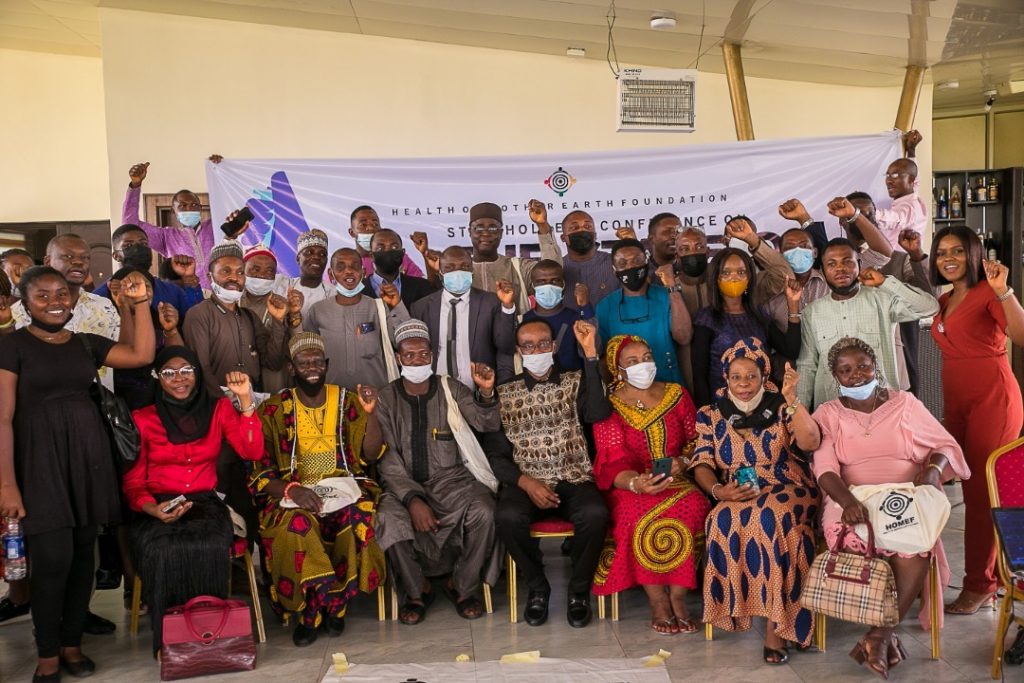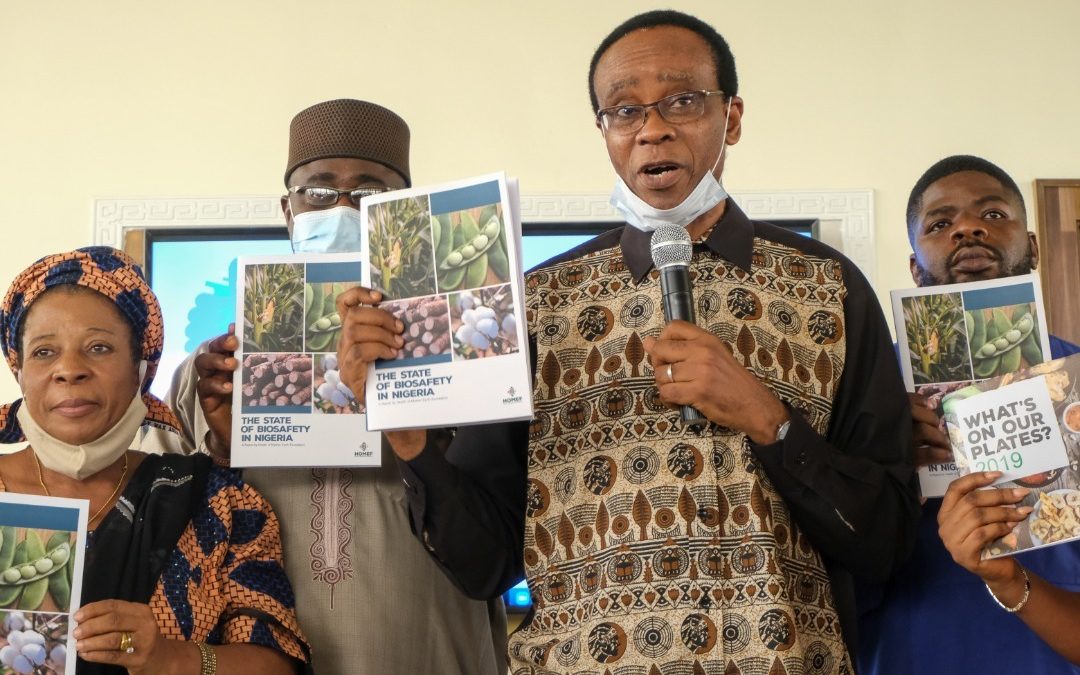There is increased push for the adoption of risky technologies such as genetic engineering especially in crop and animal breeding. This has heightened biosafety risks in many countries including Nigeria. With these risks the safety of the public and environment in these countries is not guaranteed. In Nigeria, the National Biosafety Management Agency (NBMA) is the national biosafety regulatory body established in 2015. The law setting up the body has been found to have several flaws which are limits its capacity to function as an unbiased regulatory body. It openly promotes the development and deployment of risky technologies including GMOs to the neglect of public opinion.
As of November 2020, NBMA has issued 19 permits for the introduction of GMOs into Nigeria – eight for field trials, nine for use as food and/or feed, and two (GM Cowpea/beans and GM Cotton) for commercial release. Yet, NBMA continues to claim that there are no GMOs in Nigeria.
Health of Mother Earth Foundation (HOMEF) brought stakeholders together in a-one-day conference on ‘The State of Biosafety in Nigeria’. The conference which was in-person and virtual was held on 13 April 2021 in Abuja. The stakeholders in attendance included small-scale farmers and food processors, environmental justice and food sovereignty advocates, legal and medical practitioners, academia, biosafety experts and the media. Presentations were made by Dr Vandana Shiva of Navyanda International, Mariam Mayet of African Centre for Biodiversity and Nnimmo Bassey of HOMEF. A panel made up of Dr Casmir Ifeanyi of the University of Abuja, Barr. Ifeanyi Nwankwere a legal practitioner and Joyce Ebebeinwe of HOMEF dissected various aspects of Biosafety and the acute exposure of Nigeria to avoidable risks.
In the conference, HOMEF launched two landmark reports which situate Nigeria’s biosafety situation as well as the presence of GMOs in Nigerian markets. The first report titled ‘The State of Biosafety in Nigeria’ addresses the situation of biosafety in Nigeria with regards to Genetically Modified Organisms (GMOs), their use, official and illegal release, and the level of public awareness on the subject. It also reviewed Nigeria’s biosafety regulatory system and analysed the implementation of biosafety principles such as the precautionary principle. It further exposes the fundamental flaws and gaps in the NBMA Act of 2019 (as amended). Among the defects in the law is the lack of strict liability and redress. In addition, NBMA has promoters of GMOs such as the National Biotechnology Development Agency (NABDA) on its board. This undoubtedly gives room for conflict of interest. The report presents well articulated recommendations for review of the laws for effective Biosafety and biosecurity.
The second report titled ‘What’s on Our Plate?’ shows the prevalence of GMO products in the Nigerian markets. The report is the output of market shelf surveys carried out by HOMEF from 2018 to 2020. It revealed the presence of over 30 products with genetically engineered ingredients on the shelves of supermarkets in Nigeria without any sign of their entry being authorized.
It was noted in the conference that:
- NABDA and NBMA have been campaigning for the adoption of modern agricultural biotechnology and promoting GMOs as safe without reference to known negative impacts and risks for the people and environment.
- The dangerous slide in Nigeria’s biosafety began with the establishment of the National Biotechnology Development Agency (NABDA) in November 2001 without being backed by any law and with no agency to regulate its activities.
- NBMA which is meant to regulate NABDA’s biotechnology endeavours was only instituted in 2015 – fourteen (14) years after the biotechnology promotions agency had been created. When the regulatory agency was finally created, the promoter of the technologies needing regulation got a seat on the board of the regulator (NBMA).
- Nigeria has now expanded the scope of her biosafety regulation to cover gene editing and synthetic biology regardless of higher risks and the fact that their handling of the elementary versions of the technology has created serious concerns and doubts.
- The Gene Editing Guidelines prepared and adopted by NBMA offer a peculiar process that allows some gene edited products to be approved by NBMA without going through the rules governing the approval of GMOs if the agency reckons that the product does not contain any recombinant DNA.
- More troubling is the fact that such approvals can be given within 21 days of the application being submitted to the NBMA without any public consultation or even notice.
- The fear of a projected galloping human population has literally become the vehicle for speculating on foods and for promoting risky technologies such as geoengineering, gene-editing, synthetic biology, nanotechnology, robots and 3D food printing.
- Smallholder farmers are the ones who feed the world with nutritious and tasty foods – cultivated through non-polluting agroecological practices that cool the earth and revitalize rural communities.
- These smallholder farmers have been subjected to multiple shocks over the last two decades and their shocks have been intensified by the Covid-19 pandemic. Their seeds are being demonised across the African continent in favour of those distributed by multinational seed companies.
- Unlike the earth-cooling and other people-centred impacts of agroecological practices of smallholder farmers, there is a strong connection between industrial agriculture and climate change. This is coupled with industrial agriculturists’ focus on providing animal feed and biofuels, and on food commodification leading to unending land grabbing.
At the end of deliberations the following resolutions were made by stakeholders:
- There should be a total overhaul of the Biosafety regulatory architecture in Nigeria as the gaps and flaws in the current NBMA Act of 2015 and as amended in 2019 are overwhelming.
- It is dangerous and needless to have gene editing guidelines that can label gene edited organisms as non-GMOs, thus, allowing approval of such organisms without regulation or public consultation. The guidelines are hopelessly against the interest of Nigeria and should be scrapped.
- The introduction of GMOs in Nigeria should be stopped and our natural seed varieties plus genetic resources should be preserved.
- Farmers should be supported with needed storage and processing facilities, market and extension services to ensure optimum productivity.
- More awareness should be carried out to sensitise the people generally and farmers specifically to enable them make informed choices about what to plant, sell and consume.
- The recommendations of ‘The State of Biosafety in Nigeria’ report should be duly considered.
- We should create community seed banks (for our natural seeds) to preserve indigenous varieties.
- We should support our local researchers who work with communities as partners and respect indigenous knowledge and practices.
- There is need to build the capacity of the media to be able to adequately report biosafety issues.
- We should build an inter-generational movement by equipping school age children with knowledge of biosafety issues and all that threaten a nation’s food and agricultural systems.
- We should promote agroecology and ensure it finds expression in our school curricula and farms.
- Support our farmers as they defend their rights to food sovereignty.
The resolutions were signed by individuals including the under-mentioned organisations:
List the organisations that endorsed. Exclude government, academia and media
Small Scale Women Farmers Organisation in Nigeria (SWOFON)
Nigeria Women Agro Allied Farmers Association (NIWAAFA)
Cassava Growers Association
All Farmers Association of Nigeria (AFAN)
Rice Farmers Association of Nigeria (RIFAN)
Federation of Agriculture Commodities Association of Nigeria (FACAN)
Urban-Rural Environmental Defenders
Women Empowerment Programme (WEP)
Initiative for Participation, Accountability and Inclusive Development (I-PAID)
Bio-integrity and Natural Food Awareness Initiative (BINFAI)
Environmental Rights Action/Friends of the Earth (ERA/FoEN)
Civil Society Legislative Advocacy Centre (CISLAC)
Friedrich–Ebert–Stiftung (FES)
Women and Children Life Advancement Initiative (WACLAI)
Gender and Environment Risk Reduction Initiative (GEIRI)
Youth Voyage of Nigeria (YVN)
Idama Cooperative Farm
Agriculture Advocacy Group
Women and Youth in Agriculture
Corporate Accountability and Public Participation Africa (CAPPA)
Women Empowerment and Youth Development (WOYODEV)
Human and Environmental Development Agenda (HEDA) Resource Center
Association of Organic Agriculture Practitioners of Nigeria






